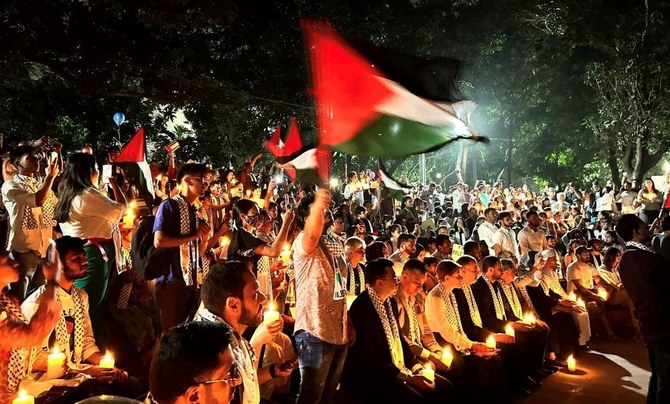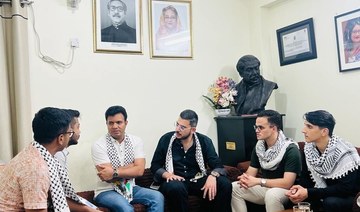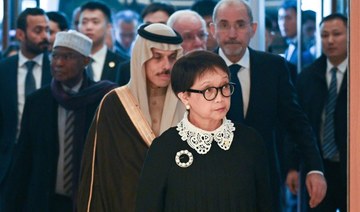DHAKA: From children to the elderly, Bangladeshi citizens have been pooling their resources for people in Gaza in the wake of Israel’s attacks on the enclave, hoping their display of solidarity will show the Palestinians they are not alone.
From the beginning of the Israeli onslaught in early October, the Bangladeshi government has repeatedly denounced the bombardments of civilians and medical infrastructure in the besieged Gaza Strip, but it is the support of ordinary people that, for the Palestinian ambassador to Dhaka, shows the deep connection Bangladeshis have with his country.
“It means everything ... And that comes from their hearts, deep from their hearts,” Yousef Ramadan told Arab News.
The ambassador recalled how two children, a brother and sister, brought a tin box in which they had been saving money for three years to the embassy.
“They brought it all to me,” he said. “And they wrote a letter saying how they feel about the children of Palestine.”
It was not an isolated story as many people have over the past month traveled from villages to visit the embassy and donate whatever they can for assistance to Gaza, where Israeli attacks have brought unprecedented destruction.
“They travel from very far, from very far places, and then they come to donate. The poor people, the people who are in need of this money ... and yet they take it, and they prefer to give it to the Palestinian people,” the ambassador said, remembering a Bangladeshi man in his late 80s who came to the embassy in the first days of the Israeli aggression to donate the money he had been saving for Hajj.
“He preferred to give his savings to Palestine and not to go to Hajj ... He came with the money,” Ramadan said, adding he did not accept the donation, and that the intention alone was worth much more than the money.
“The Palestinian people, when they hear these stories, this makes them stronger,” he said. “This gives us a push, a positive push for the people of Palestine, that ‘you are not alone’ ... there are other brothers and sisters far away geographically, but in the heart, they are very close. It’s indescribable ... it’s overwhelming.”
Israeli forces are believed to have killed at least 13,000 Palestinians and wounded tens of thousands of others, who are no longer able to receive help as most medical facilities have been damaged and cut off from essential supplies.
Two-thirds of the dead are women and children, according to the UN, which has warned that as daily Israeli strikes continue to devastate the enclave, Gaza is becoming a “graveyard for children.”
Masuma Khatun, a schoolteacher in Dhaka and a mother of three, said: “The Gazans are now facing Hell on Earth due to ongoing Israeli attacks. Innocent children, women are losing their lives in indescribable suffering. I can’t look at the news nowadays, seeing the injured children lying on the floors of hospitals.
“We, the people of Bangladesh, always stand beside the Palestinians ... To us, the ongoing suffering of the innocent Gazans feels as if a part of our body was injured.”
Khatun told Arab News that every Bangladeshi understands the Palestinian struggle and resistance to Israeli occupation, as their own nation had fought a war of liberation against Pakistan, in which hundreds of thousands of civilians were killed in 1971.
When the country became independent, advocacy for Palestine officially became part of Bangladesh’s foreign policy.
“Our father of the nation, Bangabandhu Sheikh Mujibur Rahman, expressed solidarity with the Palestinians and stood by brothers and sisters of Palestine during the Non-Aligned Movement conference in 1973 in Algiers. In 1974, during the Lahore summit of the OIC (Organization of Islamic Cooperation), Rahman stood by the people of Palestine with a very strong voice,” said Prof. Mohammad Abdul Kadir of the Department of Arabic at the University of Dhaka.
“The people of Bangladesh always expressed their solidarity with Palestinians in every possible way ... It’s our duty to stand beside the Palestinians during this Israeli aggression.”
Many in Bangladesh see this duty as something far beyond politics.
“It’s a moral obligation for all Bangladeshi people, irrespective of religion, class, and caste to support and stand beside the Palestinians because they are fighting for justice,” said Salma Begum, a young entrepreneur in Dhaka.
“The Palestinians are indomitable ... they have been struggling for sovereignty and independence for many decades and they never give up. It’s a courageous nation. I salute them.”




























